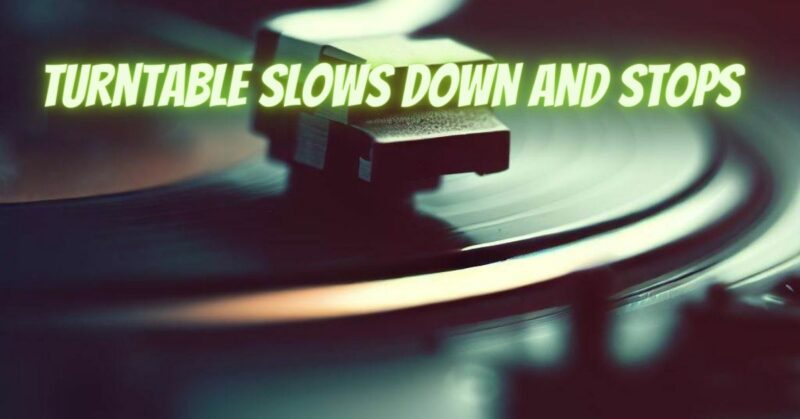Nothing interrupts the joy of playing vinyl quite like a turntable that slows down and eventually comes to a halt. This frustrating issue can disrupt your listening experience and leave you searching for a solution. In this article, we will explore common causes of a turntable slowing down and stopping and provide you with practical troubleshooting steps to address the problem. By following these guidelines, you can identify and resolve the underlying issues, allowing your turntable to spin smoothly and consistently.
- Verify Power Supply:
Inadequate power supply is a frequent cause of a turntable slowing down and stopping. Ensure that your turntable is connected to a stable power source. Check the power cord connection and ensure it is securely plugged into a grounded outlet. Avoid using power strips or extension cords, as they may not provide sufficient power. Consider using a dedicated power outlet or a power conditioner to minimize potential power fluctuations.
- Examine Belt Tension:
A loose or worn-out turntable belt can cause the platter to slow down and eventually stop. Gently press the belt with your finger to check its tension. It should offer moderate resistance, neither too loose nor too tight. If necessary, adjust the belt tension according to the manufacturer’s instructions or consult your turntable’s user manual. If the belt appears worn or damaged, it is recommended to replace it with a new one.
- Clean and Lubricate:
Dust, dirt, or aging lubricants can hinder the smooth rotation of the turntable’s components, leading to a slowdown and eventual stoppage. Clean the platter, motor spindle, and any other relevant parts using a soft cloth to remove accumulated debris. Lubricate the motor spindle and other moving parts with an appropriate turntable oil or lubricant as recommended by the manufacturer.
- Check Motor Performance:
A malfunctioning motor can significantly impact the speed and operation of the turntable. Ensure that the motor is running smoothly and quietly. Listen for any abnormal sounds or irregularities in its performance. If the motor is not functioning properly, it may require professional servicing or repair. Contact the manufacturer or a reputable repair center for assistance.
- Stabilize the Turntable:
External vibrations can interfere with the proper operation of the turntable, causing it to slow down or stop. Ensure that your turntable is placed on a stable surface, away from sources of vibration such as speakers or subwoofers. Consider using isolation pads or a dedicated turntable platform to minimize the impact of external disturbances. Avoid any movement or foot traffic near the turntable during playback.
- Professional Servicing:
If you have attempted the above steps and the turntable continues to slow down and stop, it may be necessary to seek professional assistance. A qualified technician can diagnose and address any mechanical or electrical issues with your turntable, ensuring smooth and consistent operation.
Conclusion:
Dealing with a turntable that slows down and eventually stops can be frustrating, but by following these troubleshooting steps, you can identify and address the underlying causes. Verify the power supply, check belt tension, clean and lubricate the components, stabilize the turntable, and seek professional servicing if necessary. With proper maintenance and attention, you can restore the smooth operation of your turntable and enjoy uninterrupted vinyl playback, immersing yourself in the rich sounds of analog music.


